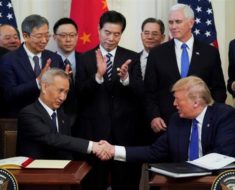The Dow Jones careened over the 27,000-mark. Even the most optimistic analyst saw the 27,000-point figure as nearly unattainable. The very next day after the market crossed this figure, indicators suggest the stock market may rise even higher. At the root of the rise appears to be the lessening of tensions between the United States and China. Specifically, both sides seemingly want out of the trade war. President Donald Trump announced he would delay new tariffs on China. The stock market won’t see the announcement as anything negative.
President Trump’s conciliatory response follows one made by China. China cut back on 16 tariffs that would harm the U.S. economy. China also took steps to reduce the impact of tariffs on its domestic economy.
All the positive news occurred within a short period leading to a stock market rally. The upswing in the economy comes a mere two weeks after the market appeared heading into recession territory.
The stock market’s ups and downs may not stabilize, though. President Trump did not remove the tariffs entirely. Instead, he pushed them from October 1st to October 15th. The two-week window allows the U.S. and China to work on a trade deal without the cloud of tariff-inspired tensions.
The grand spikes in the Dow Jones might prove short-lived if the trade talks go south. The imposition of new tariffs in late October, for example, could drive the markets down. Tariffs are receiving blame for job losses in both China and the United States. Declining employment could contribute to a recession.
China does worry about foreign companies leaving its market for less-costly, trade war-fee environments. Vietnam could prove welcoming, but any moves out of China could take years.
How long the trade war lasts is anyone’s guess. Ultimately, it is neither in the best interests of the U.S. or China for the dispute to continue.
Dil Bole Oberoi





